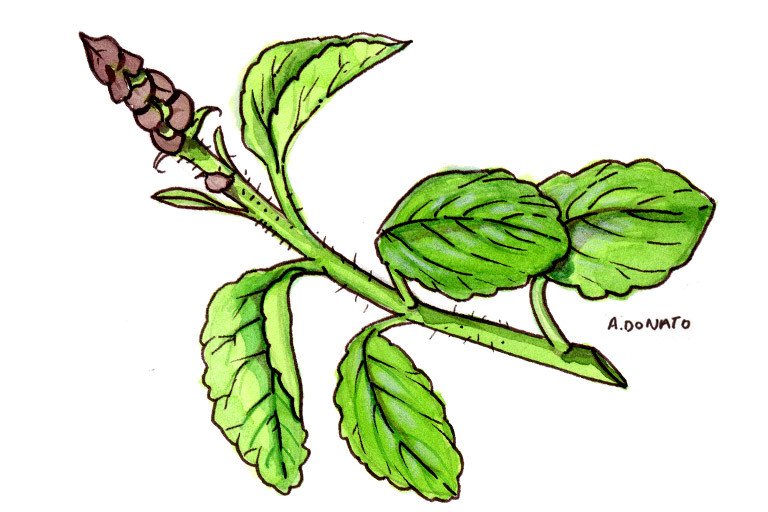
Common Names
- Makandi
- Colforsin
For Patients & Caregivers
Tell your healthcare providers about any dietary supplements you’re taking, such as herbs, vitamins, minerals, and natural or home remedies. This will help them manage your care and keep you safe.
Forskolin is used in Ayurvedic medicine for various conditions, but clinical studies that demonstrate its safety and effectiveness are lacking.
Forskolin is a root extract of the Indian plant Coleus forskohlii. It has been used for centuries in Ayurvedic medicine to treat various diseases such as underactive thyroid, heart disease, and respiratory disorders. Although anti-inflammatory and blood-pressure lowering effects have been shown in the laboratory setting, very few clinical trials have been conducted. In addition, only a few studies actually use forskolin as an oral supplement. More studies are needed to determine safety and effectiveness for various conditions in humans.
- To treat asthma
Forskolin may cause cellular changes that stimulate the dilation of airways. - To treat heart disease
Two clinical trials found positive effects with intravenous forskolin, but overall support for this use is not strong. In addition, oral forms of this herb have not been tested in humans. - To treat glaucoma
Studies in humans have conflicting results. - To lower high blood pressure
Forskolin is known to cause cellular changes that lead to blood vessel dilation, which should lower blood pressure, but there is no proof from clinical trials that this effect occurs in humans. - For weight loss
A small clinical study suggests forskolin may have benefits in obese men.
- Low blood pressure
- Slow heart rate
- Diarrhea, gastrointestinal syptoms
Patient Warnings:
- Forskolin formulations that are not designed for use in the eye, such as topical creams or extracts meant to be taken by mouth, should not be placed directly in the eye.
- Forskolin preparations should not be used by patients with polycystic kidney disease.
Do Not Take if:
- You are taking medication for high blood pressure such as beta-blockers, vasodilators, ACE inhibitors, or calcium channel blockers: Laboratory studies show that forskolin may also lower blood pressure. Therefore it may have added effects, although clinical relevance has yet to be determined.
- You are taking warfarin or other blood thinners: Laboratory studies show that forskolin may have similar effects. Therefore, it may have added effects with these medications, increasing the risk of bleeding or bruising. However, clinical relevance has yet to be determined.
Special Point:
- Although forskolin is used to reduce intraocular pressure in glaucoma, no sterile eye drop formulation is available.
- The intravenous form of forskolin is not available in the United States.
For Healthcare Professionals
Forskolin is a diterpene derived from the root of Coleus forskohlii. It has been used for centuries in Ayurvedic medicine to treat a variety of conditions including heart disease, respiratory disorders, and hypothyroidism. However, studies are quite limited and only a few actually use forskolin as an oral supplement.
Laboratory studies suggest it has inotropic (7) and antiplatelet properties (9). In animal models, forskolin promoted activation of adenylate cyclase and increased intracellular concentrations of cyclic adenosine monophosphate (1). Treatment of uropathogenic E.coli-infected mice with forskolin reduced bacteria (11).
Small clinical studies suggest that forskolin may help weight management (2) or reduce asthma attacks (4). When administered intravenously or inhaled, forskolin had a bronchodilation effect (5) (6). Preliminary findings also suggest intraoperative infusion of forskolin may benefit cardiovascular health due to anti-inflammatory effects (8) or that intraarterial forskolin daropate may improve cerebral vasospasm in patients with aneurysmal subarachnoid hemorrhage (10).
Forskolin and its derivatives showed anticancer effects (1) (23) (12). When applied on the skin of mice, forskolin stimulated production of melanin in the absence of ultraviolet light (12). It has been proposed for use in sunless tanning lotions to reduce skin cancer risk by decreasing sun exposure. A forskolin extract reduced viral production in human lymphoid CEM-GFP cells infected with human immunodeficiency virus (HIV-1NL4) (14). However, these effects have yet to be confirmed in clinical studies.
- Asthma
- Heart disease
- Glaucoma
- Hypertension
- Weight loss
Forskolin activates adenylate cyclase through direct stimulation and modulation of enzyme activities, leading to increased intracellular concentrations of cyclic adenosine monophosphate (cAMP) (1). This may explain bronchodilation (4) (5) (6), inotropic (7), vasodilatory (16), and antiplatelet (11) effects. Forskolin also increased cellular acetylcholinesterase and protected neuronal cells from organophosphate toxicity (17).
Preclinical studies suggest forskolin and derivatives may inhibit cell proliferation, and induce cell cycle arrest and apoptosis in human gastric cancer cells (18) (19). Forskolin upregulated expression of cytochrome P450 3A family via the pregnane-X-receptor that regulates CYP3A genes (20) (21).
Forskolin may contribute to cyst enlargement in patients with polycystic kidney disease. It is therefore recommended that these patients avoid preparations containing this compound (22).
Anti-hypertensives: Laboratory experiments of forskolin also suggest hypotensive effects (7). Clinical relevance has yet to be determined.
Anticoagulants: Laboratory experiments demonstrate that forskolin also inhibits platelet aggregation (9). Forskolin can also induce CYP3A gene expression and potentially increase the metabolism of drugs that are substrates of related microsomal enzymes (20) (21). Clinical relevance has yet to be determined.